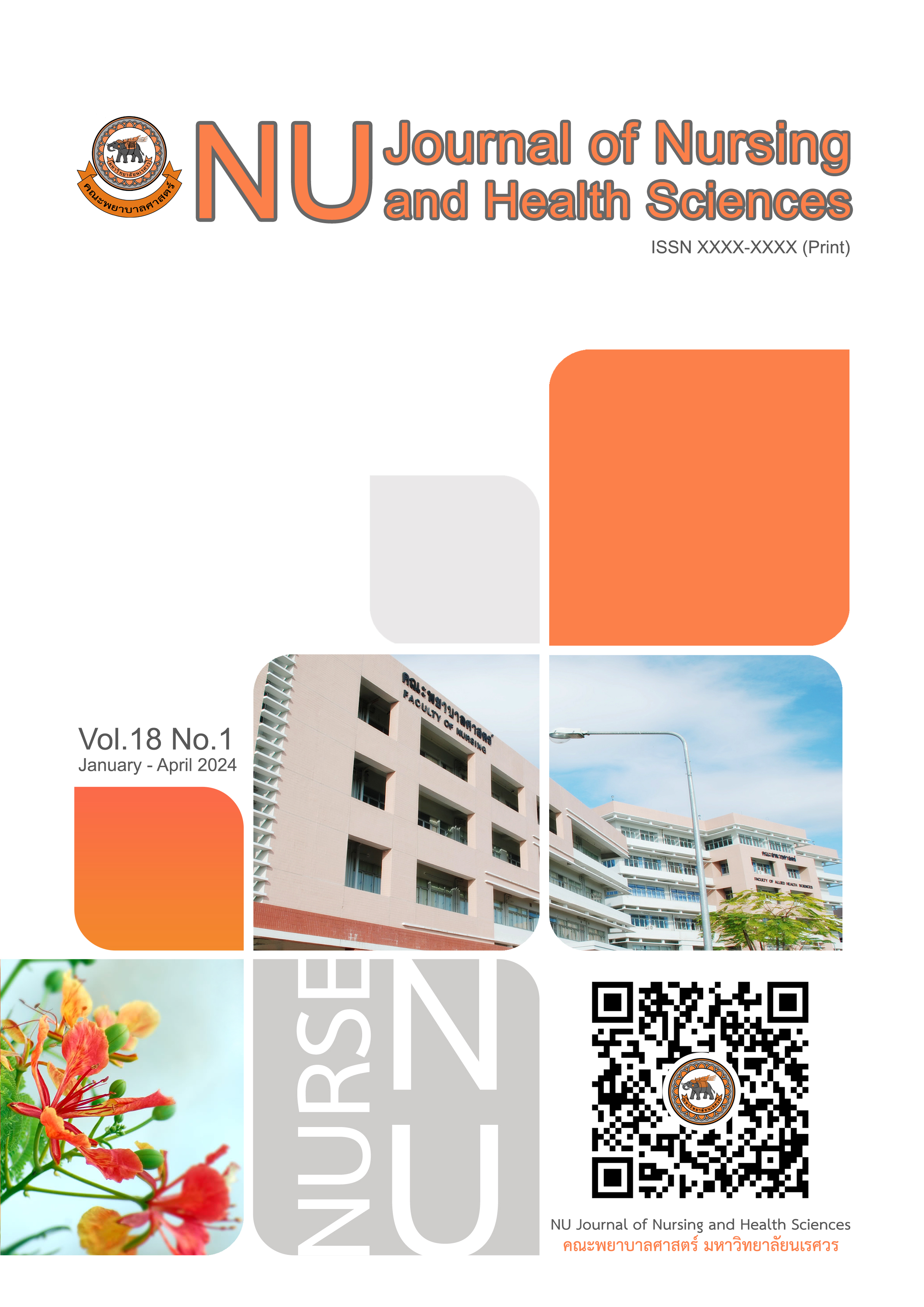A ผลของโปรแกรมการสร้างเสริมสุขภาพตามการประยุกต์ใช้โมเดลนิเวศวิทยาต่อพฤติกรรมการรับประทานอาหารและภาวะโภชนาการของนักเรียนประถมศึกษาตอนปลายที่มีภาวะโภชนาการเกิน
Main Article Content
บทคัดย่อ
ภาวะโภชนาการเกินในเด็กวัยเรียนเป็นปัญหาทางสาธารณสุขที่สำคัญการวิจัยแบบกึ่งทดลองชนิด 2 กลุ่มแบบวัดก่อนและหลังการทดลองนี้ มีวัตถุประสงค์ศึกษาถึงผลของโปรแกรมการสร้างเสริมสุขภาพตามการประยุกต์ใช้โมเดลนิเวศวิทยาต่อพฤติกรรมการรับประทานอาหารและภาวะโภชนาการของนักเรียนประถมศึกษาตอนปลายที่มีภาวะโภชนาการเกิน กลุ่มตัวอย่างเป็นนักเรียนชั้นประถมศึกษาตอนปลายที่มีภาวะโภชนาการเกิน แบ่งเป็นกลุ่มทดลอง 30 คน และกลุ่มควบคุม 30 คน รวมทั้งหมดเป็น 60 คน โดยกลุ่มทดลองเป็นกลุ่มที่ได้รับโปรแกรมการสร้างเสริมสุขภาพตามการประยุกต์ใช้โมเดลนิเวศวิทยา จำนวน 12 สัปดาห์ กลุ่มควบคุมเป็นกลุ่มที่ได้รับการพยาบาลปกติ เครื่องมือที่ใช้ในการรวบรวมข้อมูล คือ แบบสอบถามพฤติกรรมการรับประทานอาหารมีค่าดัชนีความสอดคล้องเท่ากับ0.87ค่าความเที่ยงเท่ากับ0.74และแบบบันทึกการชั่งน้ำหนักและส่วนสูงการวิเคราะห์ข้อมูลใช้สถิติเชิงพรรณนาโดยการแจกแจงความถี่ ร้อยละ ค่าเฉลี่ย และส่วนเบี่ยงเบนมาตรฐาน สถิติ Paired t-test, Independent t-test และ Chi-Square testผลการวิจัยพบว่า กลุ่มทดลองมีคะแนนเฉลี่ยพฤติกรรมการรับประทานอาหารหลังการทดลองสูงกว่าก่อนการทดลองอย่างมีนัยสำคัญทางสถิติที่0.05และภาวะโภชนาการหลังการทดลองดีกว่าก่อนการทดลองอย่างมีนัยสำคัญทางสถิติที่0.05นอกจากนั้นคะแนนเฉลี่ยพฤติกรรมการรับประทานอาหารหลังการทดลองของกลุ่มทดลองสูงกว่ากลุ่มควบคุมอย่างมีนัยสำคัญทางสถิติที่0.05และภาวะโภชนาการหลังการทดลองของกลุ่มทดลองดีกว่ากลุ่มควบคุมอย่างมีนัยสำคัญทางสถิติที่0.05ผลการศึกษาครั้งนี้ สามารถนำไปปรับใช้กับกลุ่มช่วงเด็กวัยก่อนเรียนหรือวัยเรียนที่มีภาวะโภชนาการเกินได้ เนื่องจากพฤติกรรมการรับประทานอาหารและภาวะโภชนาการของแต่ละคนมีความแตกต่างกัน โดยควรเริ่มปฏิบัติในกลุ่มเด็กนักเรียนที่มีภาวะโภชนาการเกินก่อน ซึ่งหากได้ผลดีจึงเริ่มมีการขยายขนาดกลุ่มตัวอย่างมากขึ้นจนสามารถนำไปปรับใช้กับนักเรียนทั้งหมดได้
Article Details

อนุญาตภายใต้เงื่อนไข Creative Commons Attribution-NonCommercial-NoDerivatives 4.0 International License.
เอกสารอ้างอิง
Cohen, J. (1977). Statistical power analysis for the behavioral sciences. New York: Academic press.
Fisher, E.B., Brownson, C.A., O’Toole, M., Shetty, G., Anwuri, V.V. & Glasgow, R.E. (2005). Ecological approaches to self-management: the case of diabetes. American journal of public health, 95(9), 1523-1535. https://doi.org/10.2105/AJPH.2005.066084.
McLeroy, K.R., Bibeau, D., Steckler, A., & Glanz, K. (1988). An ecological perspective on health promotion programs. Health education quarterly, 15(4), 351-377. https://doi.org/10.1177/109019818801500401.
Namyota, C., Wongprachum, K., Toontom, N. & Bourneo, C. (2022). Effect of a nutrition-promoting program on reducing prevalence of overweight and obesity in school-age children. Science and technology journal mahasarakham university, 41(1), 49-61. [In Thai].
Nateeprasittiporn, M. (2015). Effect of the overweight prevention program in preschool children’s guardians. Master thesis (Nursing), Naresuan University, Phitsanulok. [In Thai].
Singhaviseth, K. & Naveecharoen, R. (2014). Factors related to body weight control behaviors among overweight police officer. Journal of the police nurse, 6(1), 142-156. [In Thai].
Srisa-ard, B. (2013). Preliminary research (9th ed). Bangkok: Suviriyasarn printing house. [In Thai].
Sukhothai provincial public health office. (2017). Health data center. Retrieved 30 January 2017 from https://hdcservice.moph.go.th/hdc/reports/report.php?cat_id=46522b5bd1e06d24a5bd81917257a93c&id=e28682b2718e6cc82b8dbb3e00f2e28e.
Sukhothai provincial public health office. (2022). Health data center. Retrieved 30 January 2022 from https://hdcservice.moph.go.th/hdc/reports/report.php?cat_id=46522b5bd1e06d24a5bd81917257a93c&id=e28682b2718e6cc82b8dbb3e00f2e28e.
Suwanwaiphatthana, W., Parkomnok, C. & Aunchangwang, W. (2023). How to deal with overweight school – age children: New generation in the digital era. Journal of health and nursing education, 29(1), 1-14.
[In Thai].
Thanyakan, A., & Wilawan, C. (2020). Modification of behavior in food consumption and exercise of elementary school students with overweight by the participation of family and community at primary schools in the north east of Thailand. Journal of nursing and health care, 38(2), 33-42. [In Thai].
Thongtang, P., & Sisawang, J. (2012). Overweight in thai children. Ramathibodi nursing journal, 18(3), 287-297.
[In Thai].
World health organization. (2017). Obesity and overweight. Global health observatory (GHO). Retrieved 30 January 2017 from https://www.who.int/news-room/fact-sheets/detail/obesity-and-overweight.
World health organization. (2021). World obesity day 2021. Retrieved 30 January 2017 from https://www.worldobesityday.org/.


